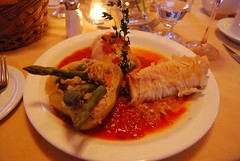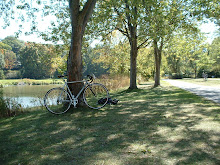
Our bookclub met this weekend to discuss
Kitchen Confidential by Anthony Bourdain, and we had a fairly good talk about it. As mentioned
below, Bourdain has very strong anti-vegetarian views, and the irony is that our book club consists of four near-vegans, one wheat free vegetarian, and one omnivore nutritionist who is careful about what she eats.
The first thing that you should know, is that I actually enjoyed the book. In fact, I'd give it about a 7.5 out of 10. I thought that Bourdain was a pretty good writer, and that he provided a really interesting look at a world - that of cooking & restaurants - that I'd never thought of before, and otherwise knew nothing about.
BUT - I obviously have issues with Bourdain's feelings about vegetarians and vegans.
Here is what I believe the situation is:
a) Bourdain hates the extremist voices in the vegan movement, and in attacking them attacks all vegetarians with one big brushstroke.
b) Unable to find a truly good argument with which to fight the main reasons for being veggie (personal health, animal rights, environmental concerns), he has made up two very weak and actually irrelevant arguments which he uses to dismiss our lifestyles.

The first of these arguments, which he writes about in his book (and as i quote in the previous post), has to do with vegetarians being more prone to illness than omnivores because we handle fresh produce more often and are therefore more likely to be infected with amoebas.
Together, let's all make that "Hruuh??" sound that Scooby Doo makes when he's confused.
So the amoebas from fresh produce are worse than the
carcinogens in North American factory farmed meat, which is so bad that it's not even allowed on the European market? And the amoebas are worse than all the saturated fat in red meats responsible for the obesity and diabetes epidemics in North America? And worse than the salmonella which is rampant in factory farmed chicken?
Whatever, Anthony. Nice try.
Secondly, as you can hear in
this You Tube video, he's come up with a "vegetarians deny themselves life experience, and do so in a very rude way" argument. This argument is that you shouldn't travel to Mexico or Cambodia and turn your nose up at the meat filled taco, or the roasted pig, because you're denying your hosts' entire lifestyle by doing so... as he says -
I'm not rejecting just your food, I'm ignoring your weird foreign lifestyle and your history and everything else.
Anthony, this is fine and dandy, and sure food is a major part of the culture of a nation, but this argument has NOTHING TO DO with why most of us are vegetarians. Would I be missing out on something, and possibly be acting rudely, by going to Japan and refusing to eat sushi with fish? Yeah, maybe. But that's an amazingly small price to pay for choosing a lifestyle which day in day out makes me healthier, is better for the planet, and keeps my money from supporting an industry in which waste and suffering are the norm. And anyway, how often am I in Cambodia for Pete's sake?!
Come on Anthony, admit it - we know from the comments in your book about how chickens are kept in terrible conditions, and that foie gras is made by force-feeding ducks and geese until they basically explode, that you know that the meat industry is actually the "torture animals" industry, and because you simply enjoy eating meat, you don't really care how it gets to your plate. Be man enough to come out and say "I support the torture of animals for my own gastronomic pleasure."
Don't make up pitiful attacks on vegetarians to move the focus from your food choices to ours.

And having just found a new Bourdain comment about animals, let me make one more point.
Bourdain, on a TV show called
Chef's Story in Oct. 2007, said the following:
I don't like to see animals in pain. That was very uncomfortable to me. I don't like factory farming. I'm not an advocate for the meat industry.Okay, so if you're willing to say all this, can you at least make that nod towards vegetarians that
Wolfgang Puck has, and say "I can't deny that I like meat, but at the very least, when I'm in North America and have the choice, I will not buy any meat that came from a factory farm."
Is that too much to ask? You can't be globetrotting and experiencing exotic cultures through their food all the time - aren't you in the U.S. sometimes and willing to pay the few extra bucks for naturally raised meat, or forgo the meat entirely?
Anyway, we had a fun night. Ate some great vegan food (lentil stew, beet coleslaw, spicy potatoes, zucchini soup), discussed Bourdain's book, played a bit of music, and then some board games, and didn't put any of our money into the pockets of guys sending cows through a dismembering line at the rate of 400 to 500 an hour in one single facility.








































